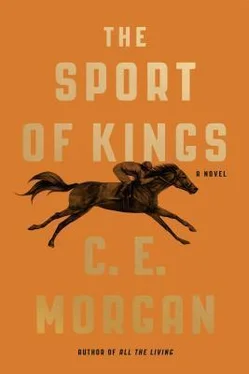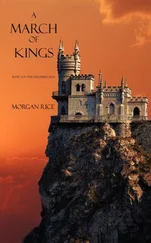“Oh, I’m not afraid of Uncle John,” Loretta tossed back. “Are you?”
Henry paused where he stood, feeling the great, reassuring warmth of the morning pressing against his back, and a prickly sense of discomfort arising. He watched, circumspect, as Loretta sashayed down the row. Then he followed his cousin into the barn, because her hips and lips were warmer than even the bedazzling light of morning.
The horses were immediately aware of their presence. They stirred, collecting one after the other at their stall doors, dark heads swinging over crib doors, drafts of air quivering down the channels of their nostrils.
“Oh,” Loretta sighed, “they smell like sunshine and earth.” She slid the palms of her hand along one filly’s jaw — the yearling foal of Martha White — and stared into her eyes, that dark, confounding space. Then she traced the jagged line of her brilliant blaze, but the other horses blew and stamped, so she moved to each in turn.
“Don’t you just love them?” she said.
Henry made a face. What use were the Walkers to him? They were predictable and unsurprising as time, heavy on their bones with their absurdly long underlines. And, too, they were the province of Filip, a man he could not think of without his stomach turning to a hard plum pit.
“Let’s ride,” said Loretta, whirling around suddenly.
“No way,” Henry said.
“Where’s the tack room?”
“No, Loretta,” he said again, more sternly, he hoped.
“I’ll find it myself then.” She started off down the row with fresh purpose, horse heads pointing the way, their tails tossing as they blew for want of affection or a ride. One Walker whickered and traced a needy circle in his stall as she passed.
Henry jogged along after Loretta, but just as her hand lifted the latch of the tack room door, and just as he was trying to draw her back, their hands wrestling briefly, the door swung open, and Loretta dragged him inward, slamming the door shut again. Before their eyes could adjust to the swamping dark, her mouth missed his for his cheek, then latched onto his lips. Her hands plied at his shoulders and his bottom.
“Lie down,” she said. He felt about with his foot, his heart beating madly, until he nudged the edge of a hayrack. He scooted back onto the bed of scratching hay, and she joined him there and began to work on the buttons of his fly. She half lay over him then, her pliant tongue reaching into unexplored regions of his mouth. The pressure of her breasts was strange and insistent as she rooted around in his shorts. His breath came in ragged draws. Then she schooled him with her hand.
Even before his breathing had slowed, he was shoving himself still half-hard into his khakis and fumbling with the buttons. Loretta lay beside him, wiping her hands on the hay, but only found that it clung to her palms.
“Do you think I was good at that?” she said.
He nodded, but inside him he discovered an awkward twinge of disappointment. Was this some kind of farewell address to childhood? It felt less than spectacular.
“Guess where I learned to do that,” she said.
“I don’t know,” he said.
“One of my teachers; he’s my boyfriend.” She waited for his response, which didn’t come. It was all he could do to get his pants buttoned in the half dark. His hands were leeched of strength, the buttons downright disobedient.
Suddenly, a small sound caused his blood to leap like a lasso, and he started up from the hay. “Relax,” Loretta hissed, “no one’s coming.”
She was right. They waited, but the only thing Henry could hear was the untaxed rhythm of her breath. There was nothing out there; even the horses were silent.
“I have to say,” Loretta said, staring at his face in the dark, “you really don’t look like you get enough sleep.”
Henry sighed. “Well, I read a lot,” he said. “I have plans.”
“Plans for what?”
Henry was silent for a moment, finding his cousin lacking in seriousness and unworthy of his private, curated thoughts, but under the spell of this new relaxation, he went on. “Nobody knows this, so you need to keep it a secret, but someday I’m going to turn Forge Run Farm into a Thoroughbred operation.” He tried to ape the calm of an adult, but his eagerness pressed through. “All this corn farming is ridiculous,” he said. “It’s a waste of this farm’s potential, a waste of this family’s legacy! Do you know how long we’ve been here? I mean, you’re in Florida now, it’s almost like you’re not part of the family anymore—”
“Hey,” Loretta said, but listlessly, and he barreled on. “This is what happens when you get complacent, when you don’t have the courage to dream big or grab the opportunities that are right before you. I mean, Tennessee Walkers? Give me a break. This is Kentucky — this land is destined for Thoroughbreds.”
“Thoroughbreds again,” Loretta sighed, and rolled her eyes.
Henry bullied her down with a rising voice. “You’re all the same! None of you know how to think big! I can’t stand the way Father’s running this place! It makes me crazy! We’re like runners in the middle of the pack. Why even compete, what’s the point? Run out front or quit.”
Loretta shrugged and rolled up to a sitting position to check the buttons on her blouse.
“Hey, where’s my headband?” she said suddenly, and turned over on her hands and knees, scouring the hay, but Henry didn’t move. He just spoke to her back.
“Everybody thinks there’s so much chance involved in horse racing, but that’s not how I see it. It’s about controlled usage of every resource. ‘Chance’ is a word ignorant men use when they don’t know how to plan and take calculated risks. Life is ten percent chance and ninety percent willpower and intelligence. Think of—”
“There it is,” Loretta said, and she returned the checkered band to her hair.
“—Signorina and Chaleureux. Their meeting on the road might have been chance, but the breeding of Signorinetta was anything but. A great breeder has to know when to seize the opportunity to get the dam’s heart.”
“Shhhhhh!” Loretta said, and she sprang suddenly up from the hay, tipped forward on her toes with her hands out to her sides in the attitude of a startled dancer.
Henry lost his thought in an instant and flung himself up, fumbling in the dark to secure his clothing. Loretta was raking wildly at her hair, all the gold straw drifting around her shoulders when the door opened.
They were confronted with a man’s embarrassed face for only a moment before they tumbled out, Henry fairly flying down the row, but Loretta stopping suddenly and saying, “Hey, you’re not Filip.”
Henry was light-blind with one foot out the barn door when he realized she wasn’t following. He said “Loretta!” hard, as if he were her father.
“Who are you?” Loretta said, gazing up with consternation into the white man’s face.
“Uh,” the man said quietly, looking anywhere but at the door the two had exited from, “I’m Robert Forester.”
“Where’s Filip?”
“Loretta!” said Henry sharply again.
“I reckon he don’t work here no more,” said the man with a shrug.
“Well, that’s odd,” said Loretta. “He’d been with this family since forever.” Baffled, she turned and walked slowly out of the barn into the now harsh light of the risen sun. She looked at Henry and said, “Why on earth would you let Filip go? He was my favorite.”
“I never could stand that nigger,” Henry said.
Now it was Loretta’s turn to rear back. “I get the feeling you can’t stand anyone! And don’t say nigger. It makes you sound like a bumpkin.”
“And you sound like a nigger lover.”
Читать дальше
Конец ознакомительного отрывка
Купить книгу












